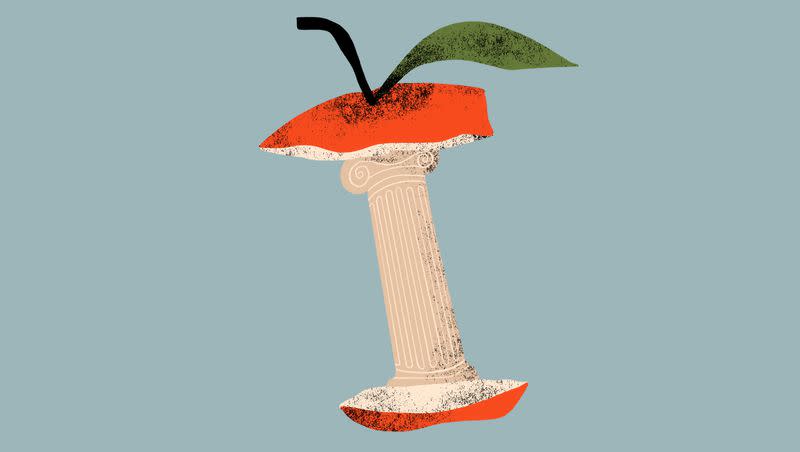There are more than 80 education bills on Utah’s Capitol Hill — here’s a look at what they would do

Utah is almost one-fourth of the way through its annual legislative session and the bills are proliferating. As of this writing, just looking at education bills, there are 51 bills drafted and publicly available and almost 30 more in process. That does not count the ones that are still behind closed doors.
It’s enough to prompt Lexi Cunningham, the executive director for the Utah State Superintendents Association, to say on X that “this is not sustainable.”
Packed house for JLC meeting yesterday. Superintendents and board members discussing bills and taking positions. First week of the legislative session and already tracking 50+ education bills. When will we reach 100 bills? This is not sustainable. #USSA pic.twitter.com/ulbx8lciI7
— Dr. Lexi Cunningham (@Lexi_USSA) January 20, 2024
The education bills run the gamut, too, from landscaping requirements, to a tax credit for educator expenses, potty-trained kindergartners, incentivizing teachers to carry and store guns at schools, to a resolution condemning abusive coaching practices. Of course there are also the bills banning diversity, equity and inclusion, including at the K-12 level and bathroom requirements for transgender students and a bill requiring the removal of objectively sensitive material.
Related
Here’s a deeper dive into a few of the education-related bills currently drafted:
Educators
HB221, Stipends for Future Educators is being run by Rep. Karen Peterson, R-Clinton, and is designed to encourage student teachers to finish their education. This bill would provide a stipend to those who are currently student teachers and enrolled in an educational program that leads to becoming a teacher. Currently, the bill sponsor is seeking $6,000 per semester, per student teacher.
SB68, Teacher Evaluation Amendments, by Sen. Kathleen Riebe, D-Cottonwood Heights, would allow for an educator who has had two consecutive satisfactory annual performance evaluations to be evaluated every other year.
Students
SB105, Student Privacy and Modesty in Public Education, by Sen. Jen Plumb, D-Salt Lake City, would prohibit a school from “requiring, inviting or encouraging a student to undress, change clothing or otherwise be in a state of full or partial nudity.”
HB172, Immigrant Student Athlete Participation Amendments, by Rep. Jordan Teuscher, R-South Jordan, would allow homeless youth, or students who are not U.S. citizens to participate in school sports by providing other forms of documentation besides a birth certificate. Those include affidavits from a parent, verified school records, immunization records or documentation from a social service provider.
Homeschool
SB13, Education Entity Amendments, does several things for home-based education entities and micro-education entities. It clarifies the definitions for both categories. Home-based education entities means an individual or association of individuals that provide K-12 services, for compensation, to 16 or fewer students (like a tutor, or a co-op). A micro-education entity ups the number of students to 100.
The bill also specifies that homeschools, home-based education entities and micro-education entities are not required to obtain a food establishment permit, or undergo local health department inspections if staff does not prepare food. Students in the specified entities are not required by be vaccinated and the local school board may not require standardized testing, inspections, or require credentials for those providing instruction. Like homeschooled students, students in home-based education entities and micro-education entities are eligible to participate in extracurricular activities in public schools.
SB56, Home School Amendment,s would remove the requirement to get a notary stamp on the homeschool affidavit filed by parents with their local school district.
Religious Displays in Schools
There are two apparently competing bills in this area. The first is HB269, Ten Commandments in Public Schools, by Rep. Michael Petersen, R-North Logan. It would mandate that all public schools display a 16”x20” poster of the Ten Commandments. If one is not already on display, then they must accept and display a donated copy.
HB303, School Curriculum Requirements by Rep. Jeff Stenquist, R-Draper, on the other hand, would prohibit school officials from using instructional materials, or displaying symbols, images or language that “endorse, promote or disparage” religious, denominational, sectarian, agnostic, or atheistic belief or viewpoint. The bill also prohibits endorsing, promoting or disparaging political views, views on sexual orientation or gender identity and prohibits “inviting, suggesting or encouraging” students to change their mind on those topics.
For your own deeper dive, go to le.utah.gov.
Holly Richardson is the editor of Utah Policy

